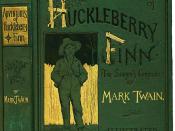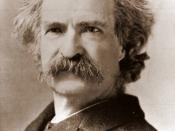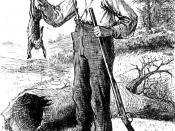He is arguably the funniest man in history. He has written eight books, eleven short stories, and even wrote a little poetry. He would sell out auditoriums for people who just wanted to listen to him. He experienced the country's vast growth and change, from westward expansion to industrialization, the end of slavery, advancements in technology, big government and foreign wars. Also along the way, he often had something to say about the changes happening in America. He is Samuel Clemens, a.k.a. Mark Twain.
Samuel Clemens was born in Florida, Missouri November 30, 1885. He was the sixth of seven children. Only three of his siblings ended up living past their childhood and his father part away when he was eleven. He was raised right on the Mississippi River in Hannibal, Missouri where he got most of his ideas for his novels later on when he began writing. At the time this was a fairly new state and it was a slave state and his father and uncle both owned slaves.
Sam spent most of his time in the slaveÃÂs quarters listening to tall tales.
2He left school after the fifth grade to work as a printerÃÂs apprentice at a local newspaper. For his time there he had to arrange the type of each story, so he read the news of the world every day. At age eighteen Sam worked at several different newspapers in New York and Philadelphia. While he was there he found success writing articles. But soon after, he returned home to become a riverboat pilot on the Mississippi River. Unfortunately that career was cut short due to the civil war breaking out. He was inspired by the times and joined a volunteer Confederate unit called the Marion Rangers, but he quit after just two weeks.
In search of a new career, Sam headed west in July of 1861, at the invitation of his brother, Orion, who had just been appointed Secretary of the Nevada Territory. Lured by the infectious hope of striking it rich in Nevada's silver rush, Sam traveled across the open frontier from Missouri to Nevada by stagecoach. On his journey he ran into many unique people, mishaps, and disappointments. These events would be used later on in his novel Roughing It.
After failing as a silver prospector, Sam began writing for a Virginia City, Nevada newspaper. This is where he first used his pen name, Mark Twain. He moved to San Francisco in 1864 because he wanted a change. Here he still wrote for newspapers. In 1865 is when Sam got his ÃÂbig breakÃÂ. It came when his short story ÃÂJim Smiley and His Jumping FrogÃÂ went on papers across the country. After this, Sam was hired by the Sacramento Union to visit and report on the Sandwich Islands, which is now Hawaii. There he was so successful that when he returned he began his first lecture tour. This tour is what first established him as a great stage performer.
3Hired by the Alta California to continue his travel writing from the east, Sam arrived in New York City in 1867. He quickly signed up for a steamship tour of Europe and the Holy Land. His travel letters met with such audience approval that they were later reworked into his first book, The Innocents Abroad in 1869. It was also on this trip that Clemens met his future brother-in-law, Charles Langdon. Langdon reportedly showed Sam a picture of his sister, Olivia, and Sam fell in love at first sight.
Sam and Olivia (Livy) dated for two years and finally married in 1870. They settled in Buffalo, New York where Sam had become a partner, editor, and writer for a newspaper called the Buffalo Express. It was in Buffalo that their first child, Langdon Clemens, was born. Soon they moved to Hartford, Connecticut. In 1872 he published his first book, Roughing It. Unfortunately soon their son Langdon died at the age of 2.
In 1873 his focus turned to social criticism which closely resembles our comedy today. He published ÃÂThe Gilded AgeÃÂ which was a novel that attacked political corruption. It also attacked Americans obsession with becoming rich in that era. From then on for seventeen years, 1874-1891, his family lived in the Hartford home. During those years his most famous work was done. These titles included The Adventures of Tom Sawyer, Life on the Mississippi River, and his best novel, The Adventures of Huckleberry Finn.
The Adventures of Huckleberry Finn was the first book published by TwainÃÂs own publishing company. It was created in 1884 called the Charles L. Webster Company.
4This was an attempt to gain control over publication and to make substantial profits. A year later he contracted with Ulysses S. Grant to publish GrantÃÂs memoirs. This two volume set provided large royalties for GrantÃÂs widow and was a financial success for the publisher.
Clemens did enjoy financial success at Hartford but he made many bad investments in inventions, which brought him to bankruptcy. To pay back his debts, Sam and Livy moved the family to Europe in 1891. He was forced to go on a worldwide lecture tour when his company failed. Later on, in 1896 tragedy struck the family when Susy Clemens died of meningitis at age twenty-four. They were then never able to return to the place of her death, so never returned to Hartford to live. Still, from 1891-1900, Sam and his family traveled around the world.
During the time from 1891-1900, Sam saw the increasing exploitation of weaker governments by European powers. This was described in his book Following the Equator. The Boer war was in South Africa and the Boxer Rebellion in China, fueled his anger toward imperialistic countries. With the Spanish- American and Philippine War in 1898, SamÃÂs wrath was redirected toward the American Government. When he returned to the United States in 1900, his finances restored, Sam readily declared himself an anti-imperialist and, from 1901 until his death, served as the vice president of the Anti-Imperialist League.
In these later years, Sam's writings turned dark. They began to focus on human greed, cruelty and questioned the humanity of the human race. His public appearances followed suit and included a harshly sardonic public introduction of Winston Churchill in51900. Even though Sam's lecture tour had managed to get him out of debt, his anti-government writings and speeches threatened his livelihood once again. Labeled by some as a traitor, several of Sam's works were never published during his lifetime either because magazines would not accept them or because of a personal fear that his marketable reputation would be ruined.
In 1903, after living in New York City for three years, Livy became ill and Sam and his wife returned to Italy where she died a year later. After her death, Sam lived in New York until 1908 when he moved into his last house, ÃÂStormfieldÃÂ, in Redding, Connecticut. In 1909, his middle daughter Clara was married. In the same year Jean, the youngest daughter, died from an epileptic seizure. Four months later on April 21, 1910, Sam Clemens died at the age of 74. He died on the day HaleyÃÂs comet was visible, which was the same day he was born.
6Works CitedKaplan, Justin. Mr. Clemens and Mark Twain. New York: Simon and Schuster, 1966.
Bloom, Harold. Mark Twain. New York: Chelsea House Publishers, 1986.
Powers, Ron. Mark Twain: a life. New York: Free Press, é2005.
Kaplan, Justin. Mark Twain and his World. New York: Simon and Schuster, 1974.
Smith, Henry. Mark Twain; a collection of article essays. Englewood Cliffs, N.J., Prentice-Hall 1963.





